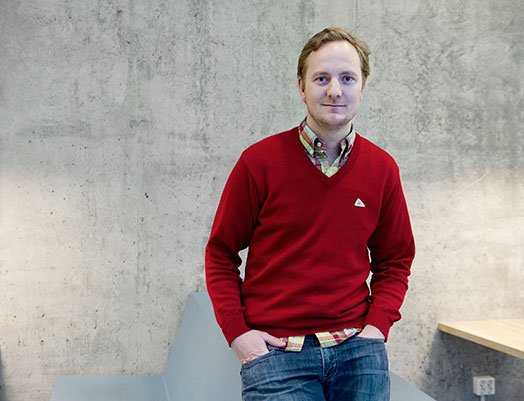Can indifference make the world greener?
We want to believe that common sense steers our choices. The problem is that we are a little lax, even when it comes to important climate issues.
10.04.2015 - Sigrid Folkestad
Mathias Ekström is a postdoctoral researcher at NHH. In the article "Can Indifference Make the World Greener?" he and Johan Egebark take our indifference as their starting point and do some experiments on it.
Exploiting the slacker mentality
We know what is good for us, yet we often avoid making decisions that will point us in the right direction.
"Our idea was this: Can people become environmentally friendly simply by exploiting their indifference?" says Ekström, who is linked to The Choice Lab in the Department of Economics.
There are several different ways people can be influenced in a more environmentally friendly direction: We can use information, we can actively push someone using moral encouragement or we can use financial incentives, for example by increasing the cost of fuel or cutting taxes.
"Another option is to give people a nudge in the right direction by making environmentally friendly choices more readily available".
The NHH researcher went into 18 departments at a Swedish university and changed the default setting on the printers from printing on one side to printing on both sides of the paper (duplex printing), for different periods.
The choice has been made
"If an option has been selected in advance, people tend to use that option even if they can freely choose otherwise. If the printer is set for printing on both sides of the sheet, people do not take the trouble to select printing on only one side, and vice versa. In this way, our laziness makes the world s little greener - assuming that we select the right default option." The results from the study show that there was a 15 per cent decline in paper consumption due to the change of the default option to the duplex printing.
"Another interesting aspect", says Ekström, "is that many departments at the university should have realised this and changed the setting to duplex printing - if not for climate considerations, at least because it saves money".
"It is precisely here that behavioural economics enters into the picture. We are not the Homo economicus that thetextbooks assume we are", says Ekström.
Encouragement from the management?
As part of the experiment, they also checked the effects of a more typical intervention in companies: A written request to use less paper. An environmental coordinator sent an e-mail to employees in a number of departments with a message requesting that they print on both sides of the sheet.
"Our study shows that our e-mail had no effect whatsoever, despite the fact that as many as 30 per cent of those asked replied that that the message would sway them to print on both sides.
"So we actually con ourselves?"
"Yes, precisely! Or at least we refuse to acknowledge that we don't always follow through".
A gentle nudge
"When the printer is set in advance for printing on both sides, we get a nudge?"
"Yes, it is absolutely a nudge - we are pushed in a more environmentally friendly direction", says Ekström.
Nudging is policy based on behavioural economics research.
"The results of this growing field of economics repeatedly show that people make decisions based on their short-term and indifferent interests, but that 'nudges', by presenting options slightly differently, can affect our choices in a direction which benefits society and our own future alike", says Ekström.
This study by Ekström is one of very few experiments that examine exactly this in a natural context.
Download the article Can Indifference Make the World Greener?
The article was published in NHH Bulletin No. 1/2015.

Mathias Ekström. Photo: Helge Skodvin
Facts
- In the UK, the government has put behavioural research into practice by building up a nudge unit; The Behavioural Insights Team - the world's first government institution that will use behavioural research in policy formulation.
- "Nudge: Improving Decisions about Health, Wealth, and Happiness" (2008) by Richard H. Thaler and Cass R. Sunstein
- Information about The Choice Lab at NHH
|

